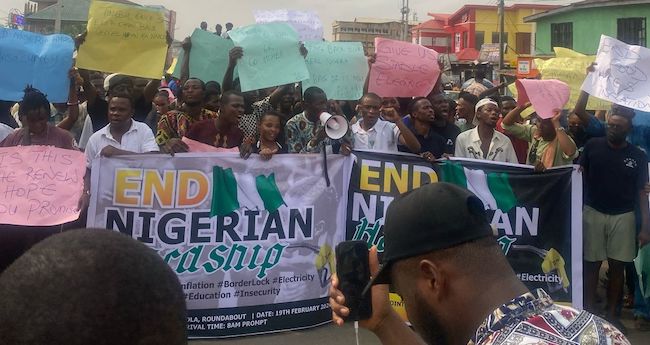Economy
Hunger: Oyo youths protest high cost of living

Nigerians in Ibadan hit the streets in protests over the high cost of living under President Bola Tinubu on Monday, with chants of ‘Tinubu ole!’ and ‘renewed shege!’ rending the air.
Placards-carrying protesters at Mokola Roundabout remonstrated on the street with inscriptions like ‘End food price hike’ and ‘This is not Hope Renewed. This is shege renewed’.
“Tinubu is thief! Tinubu is thief!” the protesters hurled their opprobrium toward the president in a video posted on X.
This came as another episode of protests against food price hikes in the country.
Similar protests had rocked Niger, Kano, Osun and Lagos (Mr Tinubu’s home state), protesting hunger and other hardships.
In the past nine months, prices of staple foods have spiked almost 100 per cent as inflation ravages the Nigerian economy.
A market survey conducted at Mararaba Market, Nasarawa, by Peoples Gazette on February 7 showed that prices of most food items have increased by almost 100 per cent compared to what was obtainable last May.
A bag of rice, a common staple food among Nigerians, now sells for N65,000 against N35,000 for which it sold last May.
A bag of yellow garri, which sold for N25,000, has jumped to N40,000, while white garri now sells for N30,000 against N13,000 for which it sold last year.
A bag of corn that sold for N19,000 last year May now sells for N60,000, a bag of Millet sold for N18,000 now sells for N55,000, while flour for baking and pastries sells for N50,000 against N28,000 for which it sold last year May.
A ‘long slate’ of ‘Titus’ (mackerel) now sells for N105,000 against N78,000 for which it sold last year. A square cartoon of ‘Titus’ sold for N38,000 the previous year now sells for N78,000, while a 25 litre of palm oil formerly sold for N31,000 now sells for N41,000.
Urah Chidiebere, a trader at Mararaba Market, lamented the rising cost of food items, saying, “People are murmuring that things are too expensive. They don’t have money to buy. People who bought a bag before now buy half, and this has affected my sales.”
“You know, if things are cheap, we make more profit. But now, nothing like that,” Ms Chidiebere told The Gazette.
Another trader, Bartholomew Ugwujah, said the spike in the prices of food is alarming and expressed concern for poor Nigerians who might not be able to afford them.
“I don’t know whether Nigerian masses can bear what is happening in the market space now,” Mr Ugwujah said. “Formerly, a packet of Maggi is N600; now it is N1000; a ‘mudu’ of garri was formerly N300, now it is N600. A ‘mudu’ of rice formerly was N1,200; now it is N2,000.”
He added, “It has affected me in that before, I used to have 10 bags of rice, now I have three. Before, I stocked 20 cartoons of spaghetti. Now, I have two.
“Every day you go to the market, your money is depreciating. Because what you bought today for N100, tomorrow you will buy it for N300. Meaning, you can’t stock the number of cartoons you stock before.”
Inflation accelerated after President Bola Tinubu’s sudden announcement of the removal of the petrol subsidy in his inaugural speech on May 29, 2023, followed later by the CBN’s policy of floating the naira.
Though lauded by experts, the duo policies of Mr Tinubu have seen petrol prices rise from N145 per litre to N630, while the naira plunges against the naira in the parallel market, trading at about N1,500 to $1.
Nigerians have cried out over economic hardship with inflation and food prices spiking under Mr Tinubu’s watch. Earlier in the week, protests over soaring food prices rocked two northern states, Niger and Kano.
Some Yoruba market women in Ogun lambasted Mr Tinubu for promulgating economic policies that negatively affect the prices of goods and cause untold hardship for Nigerians, threatening to beat the president up if they saw him.
Mr Tinubu acknowledged the country’s prevalent hardship but urged Nigerians to show understanding.
“The financial re-engineering of our country is ongoing. We are determined to deliver Nigeria safely through the tunnel of hope, stability, and economic prosperity,” said Mr Tinubu in December.
Last week, fuji maestro Wasiu Ayinde, aka Kwam 1, also Tinubu’s praise singer during his campaign, cried out over economic hardship in the country.
“Nigerians are angry, traders are angry, why is kidnapping on the increase?” Kwam 1 sang, lamenting the naira freefall against the dollar.




![Anxiety as Arik Aircraft Engine Explodes Mid-Air [PHOTO]](https://thepapers.ng/wp-content/uploads/2026/01/breaking-news-80x80.jpg)







